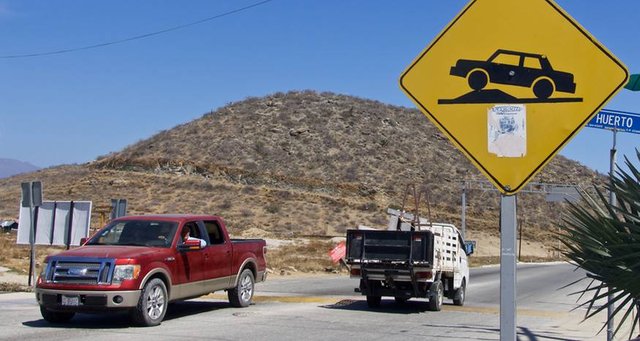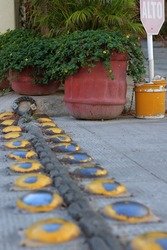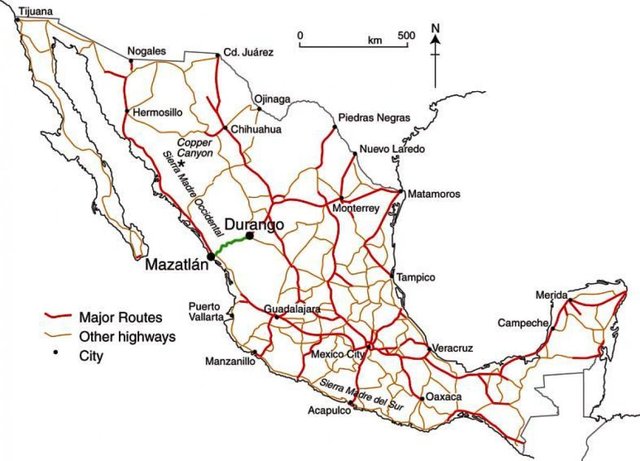One thing Mexico does very well, traffic
I will admit right from the start that I am quite jaded as far as this area of conversation is concerned because I have spent the past two decades living in countries where the roads are absolute chaos. Also, I want to point out that I am not trying to suggest that after spending a mere month in Mexico that I know everything about how the roads or anything else in the country works all over the place. I am just commenting about the stark contrast between here and the places I have lived in most of my adult life - which has been primarily Thailand and Vietnam

src
For one thing, you are almost never going to see someone driving like a bat out of hell in cities in Mexico because of "topes" which are a variety of types of speed bumps. These things are everywhere and they are not always announced by signage either. Therefore, people drive very reasonably for the sake of not destroying their suspension. The system is a bit over-the-top and could result in damages to cars even for people that aren't driving fast because some of them really come out of nowhere and are difficult to spot at night. However, I think this is a fine tradeoff when you consider the benefits. Especially in Thailand, the roads are a damn free-for-all and it is extremely common to see people driving like they are in a Fast and Furious episode. It should come as very little surprise that Thailand subsequently has one of the highest death rates per inhabitant of any country in the world.
I don't think that introducing these into Thailand would really correct anything, I think the people would still drive crazy fast and then fly wildly out of control once they hit the speed bumps.

src
There is another, less brutal type of tope that is much easier to spot on the road because they are made out of bright yellow materials. These are more noisy than they are potentially damaging to your vehicle, but people still slow down for them. The two types of speed-control bumps were used everywhere that I was driving in Mexico, which was isolated to the middle west coast, the desert highlands in the south near Chapala, and the southern west coast. In all of these places this method was widely used and while it did add time to your travel, the roads were very safe because of them.

src
I am sure you can guess what has been done to a lot of these signs by teenagers
I do want to point out that it isn't just fear of damaging their cars that impressed me about Mexico, it was the overall lack of road rage, horn-honking, and muscling for rank that I experienced on the roads. Everywhere I went people were willing to give way to you and because of this, I returned the favor to other motorists. The end result is a much more relaxed and peaceful driving atmosphere and probably a lot better safety as well. In Thailand and especially Vietnam, it is extremely rare for anyone to ever give way to anyone else and of course the horns in Vietnam are used so frequently that nobody really pays any attention to them anymore. Overuse something and it loses all meaning. It's well beyond the point of no return in Vietnam as far as that is concerned. I know that I rarely pay any attention to a horn honking because it is just a constant part of your day no matter where you go. In Mexico I only heard a horn a couple of times and this was because someone was delivering something and was parked illegally. I liked this method far more than in anywhere I have been in SE Asia.
Lastly, the highways are pretty damn nice in Mexico.

src
Many of these and almost all of the "good ones" that I drove on were toll roads and they were surprisingly expensive considering the median income of Mexicans. Some of these trips we took involved many toll booths and the total money spend to go from Chapala to Puerto Vallarta was over $40. That is expensive for sure but here's the kicker: There are free roads that you can do this trip on as well, but it is going to take twice as long, be covered in speed bumps / topes, and there are going to be potholes everywhere. On most of the tollways, this was some of the best tarmac I had ever seen in my life anywhere in the world. Our 4 hour trip, according to people that have lived there before the toll roads existed, would have taken 8 hours or more and therefore nobody ever did it. So you gotta "pay to play" and I think that is fair.
So overall I really enjoyed the road experience in Mexico. I had heard stories and seen movie type things where the police were shaking down motorists and according to my family this does happen, but it is extremely rare. One of my family members have been there for almost 10 years and this has been something they have only been victimized by once.
In Vietnam this never happens as far as I have seen or heard but that is because there is very little in the way of road enforcement other than cameras where I live. In Thailand, it is predictable and regular part of your life that annoys the hell out of everyone.
Now let's get to the bad side of these great road conditions in Mexico and something that after a month there I got really tired of. Everything is really far away so you would have to have a vehicle if you live there. Public transport does exist but it is complicated and doesn't cater to any language other than Spanish. I suppose I could learn Spanish but as it stands now I have no intention of moving to Mexico: I'm too Asian for that and like where I live.
So what's the point of all this? I don't know really but I was quite impressed that a country with little in the way of resources, just like Thailand and Vietnam, has such peaceful roads. If you are ever considering visiting there I think you can (and should) rent a car with relative peace of mind. I cannot say that this is the case in Thailand or Vietnam.